An EventLog was exported from a server to a file named Exported_ErrorLog.evtx.
I would like to
- filter all entries created in 2023
- group by Text
<EventData><Data>(see xml below) - and count
I am able to read from file (see Learn Powershell - Get-WinEvent)
Get-WinEvent -Path 'C:\dev\powershell\EventLogs\Exported_ErrorLog.evtx'
But the command help from visual-studio-code
does not really help how i can access the entries underlying properties.
.NET Log Entry .net-7.0
For example one Entry looks like this
<Event xmlns="http://schemas.microsoft.com/win/2004/08/events/event">
<System>
<Provider Name=".NET Runtime" />
<EventID Qualifiers="0">1000</EventID>
<Level>2</Level>
<Task>0</Task>
<Keywords>0x80000000000000</Keywords>
<TimeCreated SystemTime="2023-01-16T21:53:35.0432325Z" />
<EventRecordID>7198</EventRecordID>
<Channel>Application</Channel>
<Computer>our.puny.server.dotcombubble</Computer>
<Security />
</System>
<EventData>
<Data>
Category: Microsoft.EntityFrameworkCore.Database.Command
EventId: 20102
SpanId: d212092536b29df0
TraceId: b6c16c00e29da216e66009bc80c78c2d
ParentId: 0000000000000000
RequestId: 8000023a-0001-fd00-b63f-84710c7967bb
RequestPath: /User/Login
ActionId: f65f32b4-7dff-4c5d-8463-4f350cae7583
ActionName: /User/Login Failed executing DbCommand (16ms)
[Parameters=[@__user_UserId_0= ... FROM [dbo].[myTbl] AS [c]
WHERE [c].[userId] = @__user_UserId_0
</Data>
</EventData>
</Event>
Application Error Log Entry w3wp
<Event xmlns="http://schemas.microsoft.com/win/2004/08/events/event">
<System>
<Provider Name="Application Error" />
<EventID Qualifiers="0">1000</EventID>
<Level>2</Level>
<Task>100</Task>
<Keywords>0x80000000000000</Keywords>
<TimeCreated SystemTime="2023-01-18T07:59:41.3126855Z" />
<EventRecordID>7461</EventRecordID>
<Channel>Application</Channel>
<Computer>our.puny.server.dotcombubble</Computer>
<Security />
</System>
<EventData>
<Data>w3wp.exe</Data>
<Data>10.0.17763.1</Data>
<Data>cfdb13d8</Data>
<Data>KERNELBASE.dll</Data>
<Data>10.0.17763.3650</Data>
<Data>62549bf9</Data>
<Data>e0434352</Data>
<Data>0000000000034859</Data>
<Data>530</Data>
<Data>01d92b12c51b52c6</Data>
<Data>c:\windows\system32\inetsrv\w3wp.exe</Data>
<Data>C:\WINDOWS\System32\KERNELBASE.dll</Data>
<Data>ef0199e6-4724-4996-ad46-69cf5db0f138</Data>
<Data />
<Data />
</EventData>
</Event>
Questions
It seems to me that the cmd-let documentation is brief.
- Provides .Net better documented libraries to read event logs?
- How can i access the properties
<EventData><Data>of each log entry? - How to group all entries with the same
<EventData><Data>? - How can the result from
Get-WinEvent -Path ...be piped to another command?
Edit / Update: Attempts
With the help of mikes answers below i wrote this script
$filter = @{
ID = 1000, 1003
startTime = [datetime]"1/1/2023"
path = "C:\dev\powershell\EventLogs\Exported_ErrorLog.evtx"
}
$Events = Get-WinEvent -FilterHashtable $filter
$CustomEventObjects = foreach ($event in $Events) {
$xmlevent = [xml]$event.toxml()
[pscustomobject]@{
TimeCreated = $event.TimeCreated
EventRecordID = $event.RecordId
Message = $event.Message
}
}
$CustomEventObjects
I assume that $event is related to System.Diagnostics.Eventing.Reader.EventLogRecord and EventRecord
The script above results in this output
Two things are unclear
- Why is the message truncated and how can it be fixed?
- How to use
$xmleventto acces any properties

